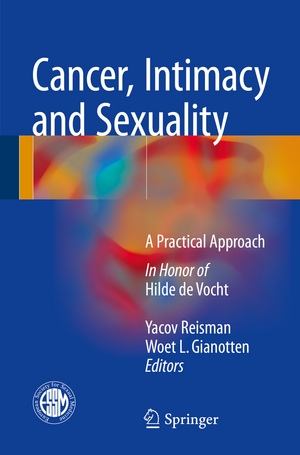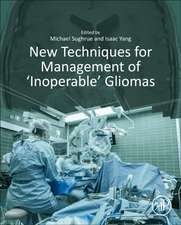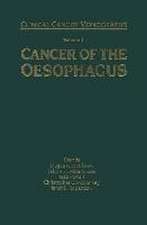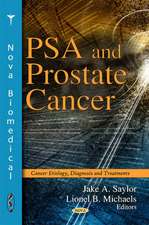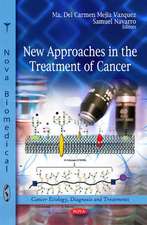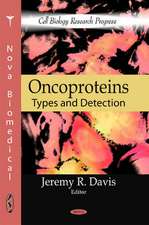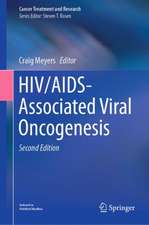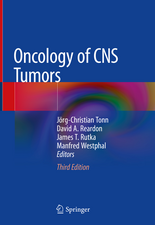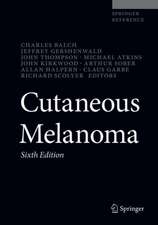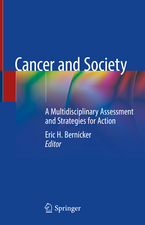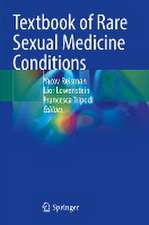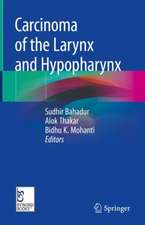Cancer, Intimacy and Sexuality: A Practical Approach
Editat de Yacov Reisman, Woet L. Gianottenen Limba Engleză Paperback – 24 feb 2017
Preț: 817.55 lei
Preț vechi: 860.58 lei
-5% Nou
Puncte Express: 1226
Preț estimativ în valută:
156.49€ • 170.04$ • 131.53£
156.49€ • 170.04$ • 131.53£
Carte disponibilă
Livrare economică 31 martie-14 aprilie
Preluare comenzi: 021 569.72.76
Specificații
ISBN-13: 9783319431918
ISBN-10: 3319431919
Pagini: 289
Ilustrații: IX, 286 p. 17 illus., 1 illus. in color.
Dimensiuni: 155 x 235 x 19 mm
Greutate: 4.51 kg
Ediția:2017
Editura: Springer International Publishing
Colecția Springer
Locul publicării:Cham, Switzerland
ISBN-10: 3319431919
Pagini: 289
Ilustrații: IX, 286 p. 17 illus., 1 illus. in color.
Dimensiuni: 155 x 235 x 19 mm
Greutate: 4.51 kg
Ediția:2017
Editura: Springer International Publishing
Colecția Springer
Locul publicării:Cham, Switzerland
Cuprins
Awareness.- Sexual consequences of the process phases.- Specific cancers.- Dealing with sexual disturbances.- Special groups.- Miscellaneous.
Notă biografică
Y. (Cobi) Reisman is Clinical Director of the Dutch Centre of Sexual Medicine, a position he took up in 2013. Dr. Reisman graduated cum laude from the Faculty of Medicine of State University Groningen, the Netherlands, in 1995. In 1998 he defended his PhD thesis on electronic diagnostic tools and objective medical decision making using the European clinical database. Since 2003 he has been registered as a urologist allied to the Amstelland Hospital in Amstelveen and since 2006 he has chaired the Dutch Men’s Health Clinics network. Dr. Reisman is a registered sexologist with the Dutch Society of Sexology (NVVS). He is an active member of the European Association of Urology (EAU), Chairman of the Educational Committee of the European Society for Sexual Medicine (ESSM), a member of the Executive Committee of the ESSM, Secretary General of the Multidisciplinary Joint Committee on Sexual Medicine (MJCSM), and co-director of ESSM School of Sexual Medicine. In the past, he hasbeen a board member of the Dutch Society of Sexual Medicine (WVSD), Secretary of the Dutch Society for Sexology (NVVS), and Treasurer of the Dutch-Flemish Federation for Sexology (NVFS). Dr. Reisman has a special interest in cancer and sexology, sexuality in chronic conditions, shockwave therapy for erectile dysfunction, and lifestyle factors. He is co-editor of the Syllabus of Sexual Medicine, Manual of Sexual Medicine, and Syllabus of Clinical Sexology, all published by the ESSM.
Woet L. Gianotten, began his career by spending more than 5 years in tropical medicine in West and East Africa, before moving to reproductive health and sexology. He spent two decades focusing on “common sexology” (where medical issues are not at stake) and then transferred to “medical sexology” (addressing sexual problems caused by disease, physical impairment, and medical interventions). During this period, Dr. Gianotten was Senior Lecturer in Medical Sexology in the University Medical Centre, Utrecht and the Erasmus Medical Centre in Rotterdam. His field subsequently narrowed to the subspecialties of rehabilitation sexology (after stroke, spinal cord injury, multiple sclerosis, etc.), gerontosexology, and oncosexology (sexuality and intimacy aspects of cancer) with a special focus on the terminal and palliative stage. Dr. Gianotten is co-founder of the International Society for Sexuality and Cancer (ISSC) and is a past member of the Executive Committee of the World Association for Sexual Health. He was co-editor of a Dutch textbook on sexology (2009) and editor-in-chief of a Dutch handbook on sexuality in disease and physical impairment (2008). Since his retirement in 2006, his core business has been teaching and training in sexual medicine/sexual health.
Woet L. Gianotten, began his career by spending more than 5 years in tropical medicine in West and East Africa, before moving to reproductive health and sexology. He spent two decades focusing on “common sexology” (where medical issues are not at stake) and then transferred to “medical sexology” (addressing sexual problems caused by disease, physical impairment, and medical interventions). During this period, Dr. Gianotten was Senior Lecturer in Medical Sexology in the University Medical Centre, Utrecht and the Erasmus Medical Centre in Rotterdam. His field subsequently narrowed to the subspecialties of rehabilitation sexology (after stroke, spinal cord injury, multiple sclerosis, etc.), gerontosexology, and oncosexology (sexuality and intimacy aspects of cancer) with a special focus on the terminal and palliative stage. Dr. Gianotten is co-founder of the International Society for Sexuality and Cancer (ISSC) and is a past member of the Executive Committee of the World Association for Sexual Health. He was co-editor of a Dutch textbook on sexology (2009) and editor-in-chief of a Dutch handbook on sexuality in disease and physical impairment (2008). Since his retirement in 2006, his core business has been teaching and training in sexual medicine/sexual health.
Textul de pe ultima copertă
This book provides a wide-ranging overview of the sexual consequences of cancer and its treatment with the aim of equipping physicians and other health care providers with the awareness and knowledge required in order to offer patients effective treatment. While sexuality may not be the primary focus for cancer patients, at some point, whether because of sexual changes of relationship issues, many patients come to acknowledge the effects that cancer and its treatment have had on their sexuality. Although the impacts are frequently similar, significant variation is observed. Some patients experience changes in all phases of sexual response, while others experience none; moreover, the consequences of the effects may be felt differently by patients and partners. Unfortunately, many physicians and health care providers remain insufficiently aware of the impact of cancer on sexuality and/or lack knowledge about the concerns of patients and the available treatments and coping strategies. A further issue is the reticence of physicians to discuss sexuality and the fear of sexologists to talk to patients about cancer. Readers will find this book to be a rich source of help in overcoming these constraints and delivering suitable care to patients.
Caracteristici
Provides a wide-ranging overview of the sexual consequences of cancer and its treatment Explains how different impacts can be effectively treated Describes useful coping strategies for patients
